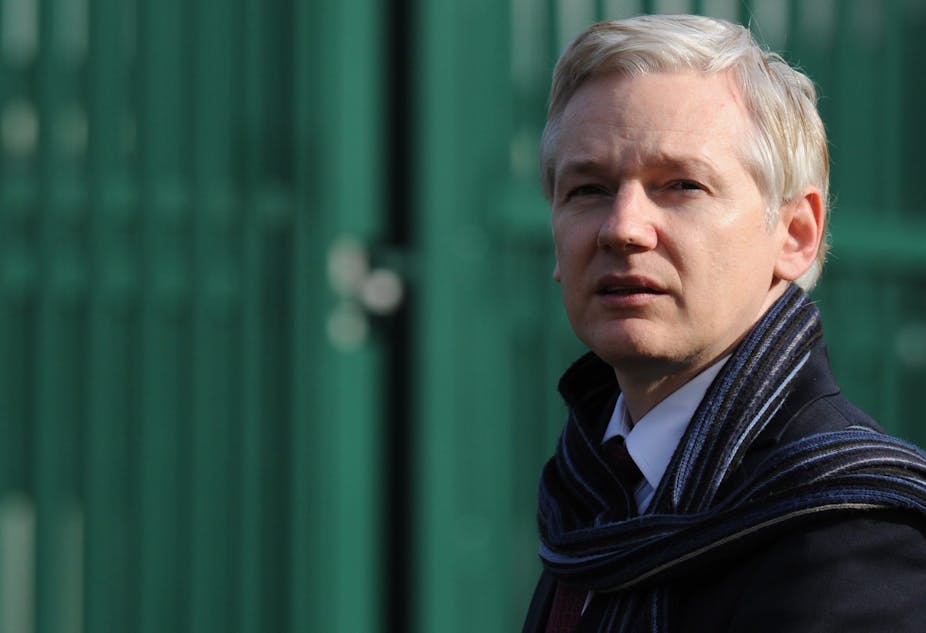In a ceremony at London’s Frontline Club on Tuesday, May 10, before an array of television crews from around the world, WikiLeaks co-founder Julian Assange received the Sydney Peace Foundation’s gold medal “for extraordinary courage in pursuit of universal human rights”.
In presenting the award, the former chair of the Foundation, the highly esteemed television journalist Mary Kostakidis, congratulated Julian Assange on his courageous advocacy of people’s right to know about decisions being made in their name by powerful political, business and military leaders.
Mary commented that the WikiLeaks release of hundreds of thousands of diplomatic cables had not only informed the public but in so doing had made a significant contribution to social justice.
As Director of the Foundation, I explained that although our major responsibility is to award annually Australia’s only international prize for peace, it does occasionally – four times in the past fourteen years – award this peace medal for initiatives which make a difference to people’s understanding of peace with justice and the means of achieving such a goal.
The distinction between peace – an end to violence - and peace with justice – the struggle for human rights through non violent means – explains the Foundation’s rationale for making this exceptional and unusual award to Julian Assange.
I acknowledged that although this Australian citizen may be controversial and in some people’s eyes so is the Foundation’s decision to present him with an award, nevertheless it is the case that those who contribute significantly to justice will always be involved in conflict and controversy.
The alternative is to adopt a cautious consensus approach to governance and thereby disturb nothing and no-one.
Contributor to democracy
The Foundation regards Assange and his WikiLeaks organisation as contributing to democracy, assuming that the operation of democracy includes the task of holding powerful people and institutions accountable, promoting freedom of information and, in the administration of justice, insisting on each citizen’s presumption of innocence.
Over the centuries, the leaders of governments of many kinds have considered secrecy to be an efficient way to conduct business, but in 1790 in The Rights of Man, Tom Paine wrote that the case for secrecy was only justified by leaders who considered the skills of governing so mysterious that only they could and should know about them.
Luckily for the cause of greater transparency in government and for those who promote human rights, a company of dissenters, from Tom Paine to Daniel Ellsberg of Pentagon Papers fame, from Independent Australian MP Andrew Wilkie to Julian Assange, have revealed the dangers to the public if decisions remain secret and if decision makers are not held accountable.
Shameful reponse
The Sydney Peace Foundation was also motivated to reward this Australian citizen because it was ashamed of the initial cowardly response of the Australian government when the Prime Minister behaved as though Assange had committed an offence and would not be welcome in this country.
That misreading of events was compounded by Attorney General Robert McClelland who claimed that Assange should perhaps have his passport confiscated.
It sounded as though the Australian Government was once again dancing to the US government’s tune.
A challenge to the US position
The Peace Foundation also wanted to challenge the violent response of American politicians and media commentators.
For example, US Vice President Joe Biden said that WikiLeaks should be identified as an international terrorist organisation and presidential hopeful, Sara Palin wanted Julian Asssange “hunted down like bin Laden”.
At the London ceremony I criticised the US Government’s “bestial treatment” of the alleged whistle blower Bradley Manning who, until recent protests from civil rights groups, was reportedly held naked in solitary confinement for 23 hours a day.
Such conduct by government flows from that culture of revenge which influences politicians and their media supporters into thinking that extreme forms of punishment and humiliation will teach people a lesson.
It never has. It never will. Julian Assange, Bradley Manning and their supporters have repudiated such a culture.
Tributes
The final tributes to Julian Assange came from two great human rights campaigners, one who wrote his tribute only a couple of days before the London ceremony and the other, with crystal ball in hand, wrote his tribute over three hundred years ago.
Writing from Boston, Massachusetts, Professor Noam Chomsky sent the following message to Julian: “I would like to thank you for fulfilling your responsibilities as a member of free societies whose citizens have every right to know what their government is doing.”
The other tribute came from Daniel Defoe, the author of such famous novels as Moll Flanders and Robinson Crusoe.
Defoe was also a pamphleteer and satirist who challenged the conformity of his day – a close alliance between church and state - and for such challenge was sentenced to time in Newgate prison and in the pillory.
While in prison he wrote the long satirical poem Hymn To The Pillory in which he hailed the values of free speech and demanded an end to the authoritarianism which prevented citizens from exercising freedom and experiencing liberty.
Four lines from that poem provided the cue for Mary Kostakidis to ask Julian Assange to accept the Sydney Peace Foundation’s gold medal.
Defoe wrote:
Exhort the justice of the land
Who punish what they will not understand,
Tell them he stands exalted there
For speaking what they would not hear.

